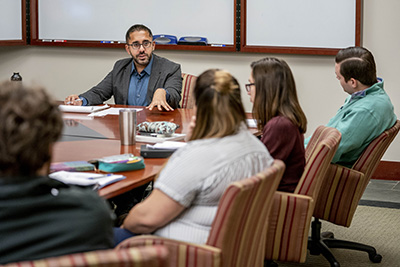The Stanton Foundation First Amendment Clinic, representing Tennesseans for Sensible Election Laws, a nonprofit advocacy group, recently prevailed in a case that sought to declare unconstitutional a Tennessee election law that criminalized false speech in opposition to a political candidate. TSEL planned to distribute a mailer criticizing a state representative. Because statements in the mailer were satirical and technically false and were in opposition to a political candidate, TSEL’s distribution of the mailer could have led to criminal charges against the organization under the statute.
After oral arguments on TSEL’s summary judgment motion, Davidson County Chancellor Judge Ellen Hobbs Lyle ruled that the statute was unconstitutional, citing several arguments presented in TSEL’s brief, co-written by clinic students. Chancellor Lyle held that the statute was facially unconstitutional after oral arguments by James Ryan ’21 and Professor Hans.
The Tennessee Attorney General appealed the holding, and current students in the clinic are again working with TSEL and local First Amendment attorney Daniel Horwitz ’13.

“Free speech is the bedrock of our democracy, and I am excited to be a part of the clinic team that gets to defend this freedom,” said clinic student Cloe Anderson ’21. “Progress is made through the dissemination of ideas, especially ideas that evaluate our elected representatives. In an election year, this is particularly relevant.”
If the appellate court agrees that the law is unconstitutional, individuals and organizations like TSEL will be able to freely engage in false speech in opposition to officeholders.
Assistant Clinical Professor of Law G.S. Hans joined Vanderbilt’s law faculty in summer 2018 to launch the clinic, funded by a grant from the Stanton Foundation, which is focused on First Amendment issues and protections. His work and scholarship examine how individuals and organizations grapple with the complex legal and policy issues involved with technology and civil liberties. Professor Hans previously served as a Clinical Fellow at the University of Michigan Law School, where he focused on intellectual property and technology law.